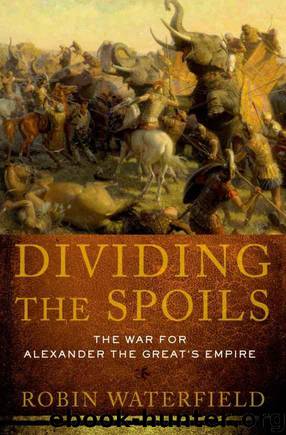Dividing the Spoils : The War for Alexander the Great's Empire by Waterfield Robin

Author:Waterfield, Robin [Waterfield, Robin]
Language: eng
Format: mobi
Publisher: Oxford University Press, USA
Published: 2011-04-20T16:00:00+00:00
PTOLEMY’S OPPORTUNITY
Cassander’s position in Greece was greatly strengthened by his alliances with Polemaeus and Polyperchon. He had given Polyperchon enough troops to make serious trouble for the Antigonids in the Peloponnese, and he could hope that in central Greece Polemaeus could contain the Aetolians. His road to recovery, however, was fated to be less smooth. Polemaeus, acting with unusual fickleness even in these days of tested loyalties, seems to have become rapidly dissatisfied with his alliance with Cassander. Perhaps the elevation of Polyperchon disturbed him, or perhaps he had come to see Cassander’s cause as hopeless in the long run. At any rate, he made the momentous decision to abandon Cassander when he responded positively to an approach by Ptolemy.
Demetrius’s repulse of Ptolemy’s army from northern Syria in 311 did not dampen the Egyptian ruler’s ambitions. In the years 310 and 309, he continued to attack Antigonus, his only rival at sea. He brutally reestablished his hold over Cyprus, against Antigonus’s intrigues there, and continued to make war on Antigonid territory in Lycia and Caria from his bases on Cyprus and Cos. Demetrius did what he could to defend southwest Asia Minor while his father was tied up in Babylon. He saved Halicarnassus, for instance, when it was being besieged by Ptolemy’s troops in 309. But Ptolemy’s gains were considerable, and, given Rhodian neutrality, he effectively dominated the approaches to the Aegean.
The usual picture of Ptolemy makes him only moderately ambitious, at any rate compared to an Antigonus.4 He was certainly cautious: he refused the regency in 320, and meticulously created buffer zones around his core territory, as if he entertained no ambitions beyond securing Egypt. But, by hijacking Alexander’s corpse, he had declared himself Alexander’s heir—and Alexander’s heir should inherit Alexander’s aggressiveness.
Rather than having moderate aims, it is more reasonable to think that he was just being patient. And there is no way to explain his actions at this time except as indicating a sustained program to gain control of Greece. First, he softened up the Greek cities under Cassander’s and Lysimachus’s control in 310 by asking them not to be tempted by the Antigonid promise of freedom, and to join his alliance instead—a move that was designed to undermine not just his old enemy Antigonus but also his former allies, Cassander and Lysimachus. Then he gained control of the southern approaches to the Aegean, and then he detached Polemaeus from Cassander. Moreover, he even approached Cleopatra, resident in Sardis, to ask for her hand in marriage. She agreed; they saw themselves soon being enthroned as the king and queen of Macedon.
Polemaeus sailed to Cos to discuss the terms of the pact with Ptolemy. The island had entered into an alliance and trading agreement with Ptolemy, and was currently Ptolemy’s advance post in the Aegean. Ptolemy’s son, the future Ptolemy II, was born there in 309, where his mother could get the best medical attention then available. Praxagoras of Cos was still alive, and laying the foundation for the
Download
This site does not store any files on its server. We only index and link to content provided by other sites. Please contact the content providers to delete copyright contents if any and email us, we'll remove relevant links or contents immediately.
The Daily Stoic by Holiday Ryan & Hanselman Stephen(3317)
The Fate of Rome: Climate, Disease, and the End of an Empire (The Princeton History of the Ancient World) by Kyle Harper(3067)
People of the Earth: An Introduction to World Prehistory by Dr. Brian Fagan & Nadia Durrani(2736)
Ancient Worlds by Michael Scott(2685)
Babylon's Ark by Lawrence Anthony(2677)
The Daily Stoic by Ryan Holiday & Stephen Hanselman(2574)
Foreign Devils on the Silk Road: The Search for the Lost Treasures of Central Asia by Peter Hopkirk(2464)
India's Ancient Past by R.S. Sharma(2454)
MOSES THE EGYPTIAN by Jan Assmann(2416)
The Complete Dead Sea Scrolls in English (7th Edition) (Penguin Classics) by Geza Vermes(2283)
The Earth Chronicles Handbook by Zecharia Sitchin(2229)
Lost Technologies of Ancient Egypt by Christopher Dunn(2225)
24 Hours in Ancient Rome by Philip Matyszak(2084)
Alexander the Great by Philip Freeman(2065)
Aztec by Gary Jennings(2028)
The Nine Waves of Creation by Carl Johan Calleman(1917)
Curse Tablets and Binding Spells from the Ancient World by Gager John G.;(1861)
Before Atlantis by Frank Joseph(1850)
Earthmare: The Lost Book of Wars by Cergat(1825)
